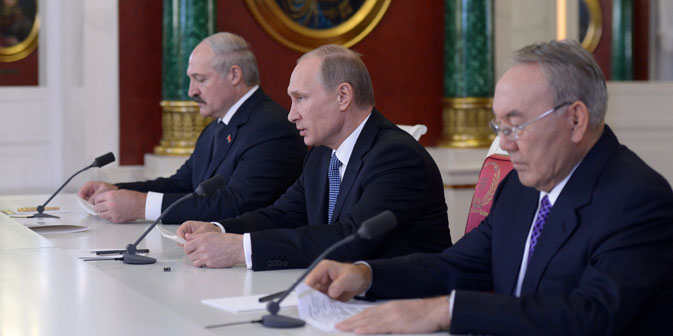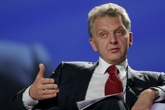Armenia signs Customs Union roadmap, Kyrgyzstan needs more talks

Presidents Vladimir Putin (center) of Russia , Alexander Lukashenko (left) of Belarus and Nursultan Nazarbayev (right) of Kazakhstan making a statement for the press after the end of the Supreme Eurasian Economic Council meeting in the Kremlin on December 24, 2013. Source: Itar-Tass
Armenia is on course to join the Customs Union with Russia, Belarus, and Kyrgyzstan by January 2015, after signing a ‘roadmap’ in Moscow. Despite declaring its interest only three months ago, it may join earlier than Kyrgyzstan, which applied in 2011.
The news was announced after an official meeting between the heads of state of the three original members and two potential ones. The meeting also included Ukraine, which has observer status. Ukrainian Prime Minister Mykola Azarov was present at the gathering.
“We welcome the interest in closer co-operation from the non-member states. We have approved the roadmap that will allow Armenia to join the union and the common economic area, and a similar document for Kyrgyzstan is virtually ready,” Russian President Vladimir Putin told reporters.
The Customs Union, which seeks to gather all ex-Soviet nations to form a free trade zone to rival the EU, is the Russian leader’s project. India is exploring a comprehensive economic partnership agreement with the union and would benefit if more CIS countries became members.
Armenia’s bilateral trade with Russia, its biggest foreign partner, reached US$1.2 billion in 2012 – a negligible amount for Moscow. Double digit growth has taken place, however, as the Caucasian country of three million people continues to recover from the effects of a severe economic crisis.
Armenia had long negotiated a potential Association Agreement with the EU, similar to the one that has been causing upheaval in Ukraine, but reversed course towards Russia in September.
Among the potential obstacles to effective membership for Yerevan are the lack of shared borders with other member states and the unresolved status of the Nagorno Karabakh region, which is contested with Azerbaijan. A special provision has been included in the roadmap, which will define the status of the region and whether it constitutes part of the Customs Union.
Kyrgyzstan’s signing of a similar roadmap will be postponed at least until the next session of the union in March, following critical public comments made by the country’s president last week.
Almazbek Atambaev told media in Bishkek that the roadmap had been “drafted without Kyrgyzstan's involvement” and risked subjecting the country to "social problems and instability."
Related:

Prospects for Eurasian Integration
The Eurasian Union – Fending off European ailments
Lukashenko: Russia, Belarus, Kazakhstan committed to create Eurasian Economic Union
Belarus and Kazakhstan are also not entirely agreed on the nature of the partnership between the member states, with Belarusian leader Aleksandr Lukashenko calling for wider diplomatic and political integration between the countries during Tuesday’s meeting, and Kazakh leader Narsultan Nazarbaev retorting that the Customs Union “must not become politicized.”
President Putin nonetheless assured that the union is still on course to come into power on the long-declared date of January 1, 2015, with details finalized by May 2014.
“Next we must document the economic obligations of the member states to ensure that they are doing everything to ensure the free economic movement of goods,” said the Russian leader.
“Eventually we are hoping that the amount of exceptions that restrict free trade will be reduced to zero,” he added.
First published in RT.com.
All rights reserved by Rossiyskaya Gazeta.
Subscribe
to our newsletter!
Get the week's best stories straight to your inbox
